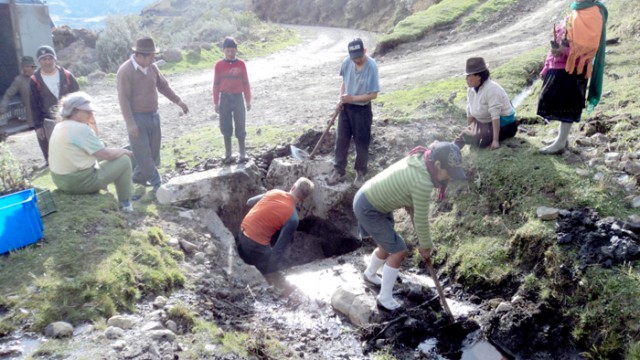
In April 2003, Pam Gilbert was hiking through the rocky and canyon-laden Andes when she and her Ecuadorian tour guide lost their way. It was sunny, and the steep slopes were sprinkled with thatched-roof huts. Two young boys planting fava beans noticed their plight from across the canyon, and walked an hour and a half out of their way to lead the two to safety. Gilbert was struck by the boys’ altruism and sense of community, and then the boys, Pedro and Lautaro, mentioned that they walked two hours every day in an attempt receive an education.
Six months after her initial trip to Ecuador, Gilbert returned to the boys’ village, Malingua Pamba, where the community expressed the need for a new classroom, among other things. Being a schoolteacher herself, Gilbert realized the greatest possibility lay in building a small and sustainable school within the village. The local residents would take part in a “minga,” a communal barn-raising or gathering in which community members complete a task meant to benefit the community as a whole.
“I went back to help the two boys get a high school education,” Gilbert says. “I’m a retired math teacher from Boulder, and I spent three years working alone before I approached organizations to help.”
But Centro Educativo La Minga, which opened in 2004, struggled for years to keep teachers because of its lack of potable water, Gilbert says. Many of the teachers fell ill and were unable to continue. Noticing a trend, Gilbert made a plea to the Denver chapter of Engineers Without Borders, an organization that originated in Boulder, hoping it might put in piping and potable water systems in Malingua Pamba to provide the village with clean water. The organization agreed to aid Gilbert’s cause.
Ten years later, the people of Malingua Pamba have a new school, potable water and frequent visits by Engineers Without Borders, whose erosion control team is currently in the process of fundraising for another trip to Ecuador. The country as a whole has seen its primary school enrollment increase from below the Latin American average in 2009 to above it, according to the World Bank.
“Pam did a lot of the work originally to get the school built down there, but they had a lot of problems keeping teachers because they didn’t have a working shower,” says Jennifer Walsh, treasurer and director at Engineers Without Borders.
Engineers Without Borders implemented potable water and irrigation systems starting in 2006, and in 2009 the Malingua Pamban community expressed the need for erosion control, prompting the erosion control program of Denver’s Engineers Without Borders chapter to be established. In 2011, supported by the International Erosion Control Association SOIL Fund and Engineers Without Borders, William Mahoney, a professional geologist and certified professional in storm water quality, spent eight days in Malingua Pamba evaluating approximately 75 eroded sites, according to Walsh.
Mahoney was able to assess the causes of erosion at 46 of these sites and suggest possible mitigation measures. In October 2012, Engineers Without Borders’ erosion control team traveled to Malingua Pamba, where it addressed five of the 46 erosion sites that had been detailed.
“On our next trip, we will visit all of the sites we worked on last year and evaluate how they are doing,” Walsh says. “We used several different erosion techniques and different species of plants, and we will probably find that some things worked better than others. We’ll use this knowledge on future sites and, if necessary, to make adjustments to previous sites.”
Pam Gilbert with Pedro and Lautaro
The team also collaborated with the community in Ecuadorian “minga” style to address the most critical erosion sites by implementing a series of “best management practices” to help prevent erosion on roads. Damage to the roads, according to a report Mahoney authored for Environmental Services International LLC, would require outside government assistance, while their compromised state would present the risk of failures in the community’s water delivery system.
“Over the years we’ve built a really good relationship with the community and they appreciate the work we’ve done,” Walsh says. “We require that they do the manual labor and make sure they have interest and buy-in. We have great turnout when we go down there and do a project. They’re really excited to do work that improves their community.”
The plants put in as part of the Engineers Without Borders effort in October have had less than a year to grow and will take a couple of years to really become established, but so far, Walsh says, the results look good.
“We have gotten pictures from the community that show good plant growth, so we are optimistic that they will continue to grow and we will have good results,” she says.
“[Engineers Without Borders] really does their due diligence,” Gilbert says. “Everything we’ve done thus far has been sustainable.”
In hopes of continued erosion site mitigation and in true “minga” style, the Erosion Control Program has organized a community fundraiser called Jam of the Andes. The fundraiser will feature the Manabí Salsa Band, and proceeds from the event will help Engineers Without Borders take their October 2013 trip to Malingua Pamba.
The Manabí Salsa Band’s leader, Achilles Quiroga, hails from the Manabi province of Ecuador, not too far from the Cotopaxi providence, where Malingua Pamba lies. He left Ecuador for the United States with nothing but two suitcases.
“It is an event that is for a good cause in my country,” Quiroga says. “We want to unify everybody with the music we play. No hate involved, being positive basically, being happy, sharing the culture, sharing the love.”
The Engineers Without Borders chapter is looking to raise $2,000 to $3,000 at the upcoming event to fund their next trip to Ecuador.
Respond: [email protected]
The Jam of the Andes benefit takes place at 6 p.m. on July 13 at St. John’s Episcopal Church, 1419 Pine St., Boulder. Tickets are $30. Additional information is available at https://sites.google.com/site/andesewb.














